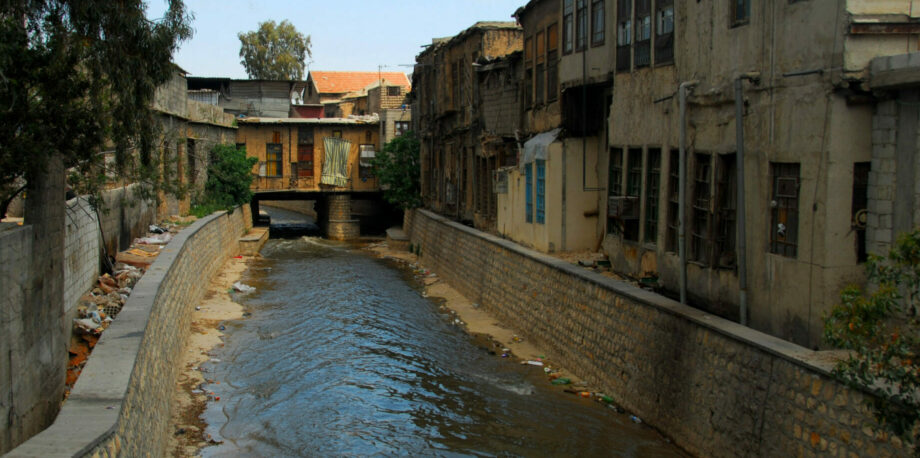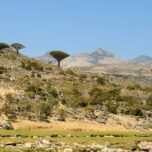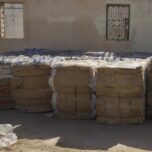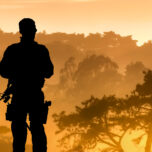July 20, 2024 —  Editor’s note: This story is part of a collaboration between Ensia and Egab exploring environmental efforts by communities facing potentially more urgent concerns such as war and poverty. Egab is a media startup that helps young local journalists from across the Middle East and Africa get published in regional and international media outlets, with a focus on solutions journalism. You can read the other stories in the series here, here and here.
Editor’s note: This story is part of a collaboration between Ensia and Egab exploring environmental efforts by communities facing potentially more urgent concerns such as war and poverty. Egab is a media startup that helps young local journalists from across the Middle East and Africa get published in regional and international media outlets, with a focus on solutions journalism. You can read the other stories in the series here, here and here.
On a cool day in March, Omar Abdulsalam walked across a stretch of empty farmland in Beit Sawa, a village east of Damascus, Syria, his head down in defeat.
Usually, by this time of year the farmer would have planted winter crops like peas and cabbage. He had the seeds he needed, but the field remained fallow because of lack of water.
In the past, Abdulsalam would have tapped the Barada, an ancient river that winds its way down the Anti-Lebanon Mountains to Damascus, where it breaks into seven tributaries feeding the verdant countryside of Ghouta. For years, local irrigation authorities who handle the distribution of water supplies allocated farmers a certain amount of time each week of the river’s water, depending on the size of the farm, but enough to irrigate crops. But in 2019, farmers say the flow to Ghouta was cut off. Years of overuse, pollution and drought had narrowed it to a waste-filled trickle.
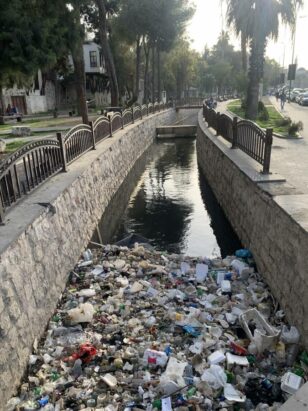
Years of overuse, pollution, drought and the impacts of ongoing conflict have turned the Barada River from a lifeline for drinking water and irrigation to a waste-filled trickle. Image courtesy of EJAtlas, licensed under the terms of the Creative Commons Attribution-NonCommercial-ShareAlike 3.0 Unported license
Syria is embroiled in a war that has already lasted some 12 years, killed more than 306,000 people, displaced around 14 million more and left nearly 70% of Syrians — 15.3 million people — needing humanitarian aid. Seeking safety from the conflict, hundreds of thousands of Syrians have fled to Damascus and its outskirts, and “an explosion of informal buildings popped up, mostly along Barada’s banks, piping in water and emptying out sewage,” says Rashid Dahna, an agriculture teacher at Damascus University.
In the face of such destruction and despair, nature has been an overlooked victim.
Restoring a Lifeline
For Damascenes, the Barada River has long been a source of pride, and its abundant flow has, for centuries, been a lifeline for drinking water and irrigation. So, the Barada’s demise prompted many to do what they could to restore the river, despite the odds.
Faten Madani was 19 years old when, in 2017, she joined hundreds of volunteers in a one-week river cleanup campaign. Despite the missiles and bombs that were destroying parts of Syria, the mostly young cleaners, armed with shovels, sticks and brooms, scooped piles of garbage floating in the river’s murky waters.
“There was always the fear of a missile landing on us, or an explosion blowing us up. Our families said we were at grave risk since our numbers made us easy targets,” Madani says. “But my grandfather’s tales of Barada’s floods and how it gushed through the capital is worth it. It’s something I’d love to relive.”
In theaters of conflict, like eastern Ghouta, “toxic munitions left from years of pitched battles seeped into the river,” notes Dahna. Hampered by international sanctions, the government is unable to repair treatment plants that were destroyed or made inoperable, Dahna adds, while factories continued dumping trash and chemicals in the river amid lack of government oversight. In Rabwah, an area just outside Damascus, restaurants and tanneries regularly pour waste directly into the river. Insects swarming over stagnant water have become a common sight. Rancid smells often waft over the city.
And then there’s climate change. Years of higher temperatures and lower rainfall have further choked the river. “Barada’s flow during summer is now a puny 1.5 cubic meters [53 cubic feet] per second, a fraction of the 12-meter-per-second [39-feet-per-second] gush recorded in the 1960s,” Dahna says.
Washing the River
Friends of Damascus Association, the nonprofit entity whose cleanup campaign Madani had joined, has led several efforts, starting before the unrest, under the slogan “Lenaghsel al-ta’ab ‘an Barda,” or “Let’s wash the fatigue away from Barada River.”
“Some people don’t see environmental issues as all that important, but the Barada River issue is critical because of how polluted it’s gotten and its impact on groundwater and agriculture,” says Mazen Hammour, chairman of the board of directors of the association.
“Life is difficult for most Syrians now. Many are barely making ends meet. But the environment is a key issue, too. This river is. The war one day will be over. But the Barada River should not.” —Soulaima Jabi
In 2023, Syria’s economy hit an unprecedented low. The financial collapse of neighboring Lebanon; the U.S. Caesar Act, a 2019 law imposing sanctions on foreign persons engaging with the Syrian regime; and then Covid-19 together catalyzed a steep and rapid deterioration. In two years, the country’s lira had decreased in value more than it did between 2011 and 2019. Amid this economic crisis, Friends of Damascus directed its efforts toward aiding the growing poor population, and later, victims of an earthquake last February that killed thousands of people and left many displaced.
Similarly, Essam Habbal, whose call to clean up the Barada in 2009 drew over 1,500 participants and filled 40 garbage trucks with waste from the river, has not organized any such events since 2020. “Costs have multiplied, and many people have left the country because of the terrible economy and security situation,” he says. “People would also criticize us. They’d say, ‘People are dying and you’re busy saving an already dead river.’”
But some are still trying.
In March, Soulaima Jabi, chairwoman of the nonprofit Bedayat Foundation, organized a cleanup event aimed to remind people that they should not let their own despair lead to apathy, or worse, toward the river. “We found a dead cow and baby nappies. These should not be in Barada,” she says.
She only managed to get 10 volunteers to join. “Life is difficult for most Syrians now. Many are barely making ends meet,” she says. “But the environment is a key issue, too. This river is. The war one day will be over. But the Barada River should not,” she says.
River Revival
Ghada Belal, director of an initiative called “Revival of the Barada River,” launched by the University of Damascus under the influence of the Syrian government in 2022, doesn’t think voluntary cleanups are all that helpful — and says they can even be dangerous because volunteers risk their health as they come in contact with insects and rodents around the river.
By bringing together experts, “Revival of the Barada River” aims to conduct comprehensive studies on the river to explore solutions for solid waste, urban planning, population encroachment and water for agriculture.
“Solutions are being put in place for every specific type of pollutant, and its source, to address them efficiently, and through clear plans,” says Belal. “The aim is not to clean the water, but ensure that it remains clean, and so restore the river and its biodiversity. Therefore, all aspects and factors are being taken into consideration.”
The university has signed two memorandums of understanding with Italy’s Maiella National Park to improve the health of the Barada River. The two entities are looking to get the Barada River added to UNESCO’s world heritage list in hopes that raising its profile would help win more support for cleanup.
Related Posts
Ensia shares solutions-focused stories free of charge through our online magazine and partner media. That means audiences around the world have ready access to stories that can — and do — help them shape a better future. If you value our work, please show your support today.
Yes, I'll support Ensia!